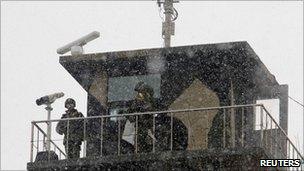South Korea's Yeonpyeong island breathes back to life
- Published
The BBC's Nick Ravenscroft: "This is not a repair job, this is a demolition job"
North Korea's attack on a South Korean island in November pushed the two Cold War enemies dangerously close to a wider confrontation.
Four people - including two civilians - were killed when shells rained down on Yeonpyeong, which sits isolated from mainland South Korea - just a few short miles off the North Korean coast.
Those who were evacuated are now returning to rebuild their community. But there's a deep anxiety about the future.
Standing amid the crumbling, charred remains of what used to be her home, Lee Hyun-mi tells me what happened on 23 November when the bombardment began.
"Suddenly the windows shattered and I ran out of the house. Our neighbours' place was already on fire," she says.
"Then, realising the North Koreans might have attacked, I fled. When I came back to the house, I couldn't believe the destruction."
Ten paces away is her restaurant - still standing - but which has been lifeless since then. Today she lights the gas burner and once again sends the aromas of onion, garlic and chilli wafting out of the kitchen to the diners outside.
So she has an income now, but only a hut-like temporary home for her family to live in. And even when their house is eventually re-built, she's not sure life can ever be the same as before the shelling, which started without warning on a sunny lunchtime just like this one.
"The fear is the North Koreans will invade the island and take us hostage. One time I woke in the middle of the night and had a strange feeling. So I locked all the windows. Only yesterday there'd been rumours of an attack. And everybody fled to the bunkers."
The destruction was seemingly random. Buildings stand unscathed next to whole blocks which were flattened by the shells and burned by the fires that raged.
Nearby, Choi Soon-nan squats in the ruins, sifting dust and memories.
"I want to chase after them," she mutters, referring to the people who did this. "If I had the opportunity, I would cross over into North Korea, chase them down and kill them."
Future deterrent
Last year was tense enough already. A South Korean warship was sunk in March, killing 46 sailors - Pyongyang was blamed but denied involvement.
And so North Korea's attack on Yeonpyeong Island pushed the two Cold War enemies - whose 1950s war ended with a ceasefire but not a peace treaty - close to the brink.
For weeks, a more serious conflict seemed on the cards. The atmosphere did cool in the New Year, but now the two Koreas have fallen back into their familiar stand-off after military talks failed last month.

There is a heavy South Korean military presence on Yeonpyeong island
North Korea makes threats in response to military drills one week, drops propaganda from the air the next and then threatens defectors another day.
And each time the tension is ramped up, the people who live on this tiny speck of South Korea, whose mountains stand sentry-like on the horizon, fear another assault.
It is understood Seoul has strengthened the island's military capability and will deploy attack helicopters there to deter a future invasion by North Korean special forces.
Those on Yeonpyeong who are not in the military are in the fishing industry.
At the busy harbour, cranes lift anchors up out of boats. These anchors are used to fasten nets in place and were abandoned at sea during November's attack. They are only now being retrieved.
Braced against the bitterly cold wind is Kim Gwi-jin, watching on. He fears for the island's fishing industry.
"At the moment, we're trying to get things back to normal. But it all depends on what the North Koreans do in the future. If they appear hostile, then our navy will react by restricting our fishing grounds. If this means our boats can't go out, that'll have a big impact on our livelihood."
Three out of four islanders have now returned. Repairs are continuing at an impressive pace. While piles of broken windows mount up, teams of glaziers have been working non-stop to replace them. The physical damage to Yeonpyeong Island's town is being put right.
But the psychological damage to the community is perhaps more of a threat to its existence.
Did 23 November, when the shells rained out of the sky, mark the beginning of the end of this community?
"For the wounds to be healed, it will take time," says Roh Se-duck, who works at the island's administrative office. But he dismisses the notion that the town's days are numbered.
"I believe that things will return to normal. But only in the distant future."
Most of the civilian population of Yeonpyeong was born here and many say they will stay, despite the threat from North Korea just a few miles across the sea.
But the Cold War conflict between the South and North was never properly consigned to history. And for this island community, it feels very much in the present.